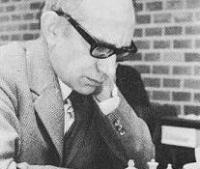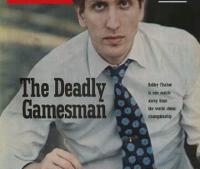
Play to Win!
Grandmaster in 4 years!
Jorgen Bent Larsen was born in Thisted, Denmark, on March 4, 1935. He learned to play chess when he was 6 but did not begin to play seriously until he was 17. By age 19 he became an International Master, and two years later in 1956 with his gold-medal performance on board one at the Moscow Olympiad he achieved the grandmaster title. Larsen had already captured 3 Danish Championships by this time! From an eventual six titles: 1954, 1955, 1956, 1959, 1963, and 1964.
The Road to the World Championship
On the road for the World title he shared first place in the Interzonal of Amsterdam 1964 with 17/23. In the 1965 Candidates' matches, he first defeated Borislav Ivkov at Bled by 5½–2½, but lost in the semi-final, also at Bled by 4½–5½ to former world champion Mikhail Tal. In 1967 he won the Sousse Interzonal; and won his first-round match against Lajos Portisch by 5½–4½ at Porec 1968. He then lost the semi-final by 2½–5½ to Boris Spassky, who went on to win the title in 1969. He shared 2nd in the 1970 Palma de Mallorca Interzonal, with 15/23, behind Bobby Fischer. He then defeated Wolfgang Uhlmann by 5½–3½ at Las Palmas 1971. But then he lost the semi-final 0–6 in Denver to Fischer, who also went on to win the title. He did achieve another Interzonal victory at Biel in 1976 with 12.5/19 and a Candidates appearance at Rotterdam where he was defeated by Lajos Portisch by 3½–6½ in Rotterdam.
Chess Olympiad Success
He represented Denmark six times in chess Olympiads, playing always on first board, and compiled an aggregate score of 75/109 (+61 =28 −20), for 68.8%, according to olimpbase.org. He always played a very high number of games, almost all of the rounds, and won three board medals, one gold and two bronze.
Amsterdam 1954 board one, 13½/19 (+11 =5 −3), board bronze medal;
Moscow 1956 board one, 14/18 (+11 =6 −1), board gold medal;
Munich 1958 board one, 13/19 (+11 =4 −4);
Havana 1966 board one, 11/18 (+9 =4 −5);
Lugano 1968 board one, 10½/18 (+8 =5 −5);
Siegen 1970 board one, 13/17 (+11 =4 −2), board bronze medal.
The First Chess Oscar
Larsen played in a lot of strong events. He won at Le Havre 1966 with 9/11, ahead of Lev Polugaevsky. At Santa Monica 1966 he placed third with 10/18, behind Spassky and Fischer. He won at Havana 1967 with a powerful 15/19, ahead of a strong group which included Mark Taimanov, Smyslov, Polugaevsky, Gligoric, and Miroslav Filip. He shared 2nd–3rd places at Dundee 1967 with 5½/8, behind Gligoric. He won at Palma de Mallorca 1967 with 13/17, ahead of Smyslov, Mikhail Botvinnik Portisch, Gligoric, and Borislav Ivkov. For his tournaments achievements during 1967, including first-place finishes in Palma and Havana, he later became the recipient of the inaugural Chess Oscar award.
When the U.S.S.R. vs. the Rest of the World match took place in 1970, he played top board for the World, scoring 1.5-1.5 against World Champion Spassky.
In January of 1971 he achieved his peak rating of 2660.
From the early 1970s on, he and his Argentine-born second wife, Laura Beatriz Benedini, divided their time between homes in Las Palmas and Buenos Aires.
Play to Win!
Larsen's success was due to always playing to win. I had the opportunity to play with Larsen in San Martin, Argentina in 1995. He defeated me, and it was a great experience to play chess with this legend.
Reshevsky said of him: "He is a firm believer in the value of surprise. Consequently, he often resorts to dubious variations in various openings. He also likes to complicate positions even though it may involve considerable risk. He has a great deal of confidence in his game and fears no one."
He died in Argentina on September 9, 2010 at the age of 75.
See if you can find how Larsen won the following games:
Larsen also left the world an excellent book, which any fan of his chess should check out:







